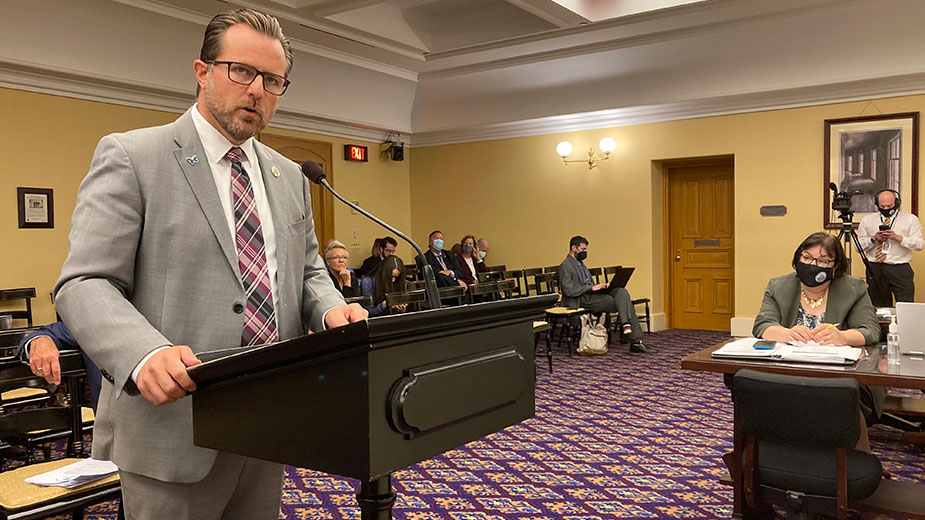Hearings Resume on Ohio House Anti-Vaccine Mandate Bill
By ANDREW WELSH-HUGGINS Associated Press
COLUMBUS, Ohio (AP) — The right of individuals to decline the coronavirus vaccine and the right of businesses to require it as a condition of employment are at the center of debate over proposed House Republican legislation limiting employers’ ability to mandate COVID-19 vaccination.
Lawmakers on Wednesday began additional hearings on the bill after a failed effort last week to fast-track a full House vote on the legislation. All major business and health care organizations oppose the legislation that would allow public and private sector employees to seek exemptions from employer-mandated coronavirus vaccines.
Lawmakers are not determining whether the COVID-19 vaccine works, but trying to balance the rights of individuals and the rights of businesses, said House Commerce and Labor Chairman Dick Stein, a Norwalk Republican. Studies have shown that the two vaccines available since December—the Pfizer and Moderna vaccines— are highly effective at 90% after two doses at preventing COVID-19.
State government should not tell businesses how to run their companies, including safety measures like vaccines, Ross McGregor, a factory owner from Springfield, testified before the committee.
“Employers are in the best position to make what decisions to protect their company, not the government,” said McGregor, a former Republican House lawmaker who testified on behalf of the Ohio Manufacturers’ Association, which opposes the legislation.
Under the bill, employees who could show proof of COVID-19 antibodies, proof they run the risk of a negative medical reaction, or those who don’t want the vaccine for reasons of conscience, including religious convictions, would also be exempt from employer mandates.
The GOP-controlled House Health Committee approved the bill on Sept. 28, the same day it was introduced and its sponsors predicted quick passage by the full House.
But House Speaker Bob Cupp announced that it needed more time. The bill was moved to the Labor and Commerce Committee for more hearings, including the one held Wednesday.
A coalition of major Ohio business groups, universities, doctor and nurse professional organizations, health care associations and hospitals has announced their opposition.
Meanwhile, the conservative Ohio Christian Alliance declared on its website, “Why are they rushing this bill?”
The opposition from business and medical groups came even though the legislation is a more moderate version of its predecessor in legislative debate, an anti-vaccination bill that included a ban on employers requiring vaccines of any kind, including for diseases such as the flu. That measure is considered dead.
Even if eventually approved and signed into law by Ohio Gov. Mike DeWine — who has signaled his objection to banning companies from enacting vaccine mandates, especially hospitals — the legislation still wouldn’t take effect until next year.
The exemptions would also be available for employees and students at Ohio’s public and private schools, colleges and universities. Governments would be prevented from requiring proof of vaccination to enter locally or state-owned public facilities, which would include publicly funded sports stadiums, under the legislation co-sponsored by GOP Reps. Rick Carfagna of Delaware and Bill Seitz of Cincinnati.
The legislation does not prevent private businesses from requiring proof of vaccination.
The House bill isn’t universal in allowing the exceptions to COVID-19 vaccine mandates. For example, employees of children’s hospitals, employees who work on hospital intensive care or critical care units, and employees who start work after the proposed legislation takes effect would not be able to claim the exemptions.
Employees would not be responsible for costs imposed by employers for alternative methods to prevent the spread of the coronavirus, such as masking or testing, according to the bill. Employees would have to cover the cost of proving they already have antibodies to the coronavirus.
Pictured: Rep. Rick Carfagna, a Delaware Republican, discusses newly introduced legislation that would provide three exemptions for employees from being required to receive a coronavirus vaccine, including showing proof of natural antibodies from COVID-19, on Tuesday, Sept. 28, 2021, in Columbus, Ohio. (AP Photo/Andrew Welsh-Huggins)
Copyright 2024 The Associated Press. All rights reserved. This material may not be published, broadcast, rewritten or redistributed.



